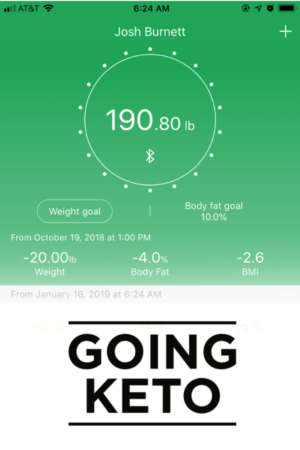A number of factors influence weight loss: caloric deficits, the quality of the calories you’re consuming, your mealtimes—and those are just related to what you’re eating! Hydration, sleep, and hormones play critical roles as well. Pre-existing health conditions can further complicate things.
The single most important thing to take away from what I’m writing here is this: don’t allow yourself to become overwhelmed.
Everyone has an opinion (me included). Ask ten different people for why you’re struggling with weight loss at any given point, and you’ll probably get 11 different answers. It can be challenging to look at other people who seem to be able to lose weight with barely any effort, while during your first two weeks on a diet you actually gained weight! It’s enough to drive you mad at times.
Don’t. Get. Overwhelmed.
I know—it’s easier said than done. Trust me, I know. But there are a few things you should keep in perspective.
First, there’s a reason you’re where you are right now. The choices you made created the weight gain, and the only way to lose that weight is to begin making different choices. Don’t take this as condemnation or judgment; it isn’t—we’ve all been there. If anything, this should be encouraging: you have control over your body, your health, and your lifestyle. Your choices define you, and you have the power to change the way you make decisions. You are in the driver’s seat.
Second, focus on your reasons for making a change. It isn’t uncommon for us to run up against walls, hit plateaus, or just experience difficulty when we’re the only one at the holiday party chowing down on celery while everyone else is stuffing their faces with cookies and eggnog. Giving up won’t change your situation—it won’t accomplish what you set out to do. Take a deep breath, grab a notepad, and revisit that moment when you made the decision to change something. Write down what your motivation was and focus on that, not the difficulty.
Everyone agrees on the basics
Finally, begin to work through the various factors you need to consider when losing weight. Contrary to the impression you might get reading through various weight loss magazines, with their plethora of diet options and mindsets, everyone who knows anything about how the body functions agrees on the basics of effective dieting. Here are a few things you’ve gotta master:
- Stay hydrated.
- Get sufficient, quality sleep.
- If you want to lose weight, eat fewer calories than you need each day to create a caloric deficit.
- Don’t drop your calorie count so low that your body freaks out and goes into “survival mode,” where it lowers your metabolism because it thinks you’re trying to avoid starving.
- Eliminate processed foods from your diet and focus on healthy, whole foods.
- Talk to your doctor about any preexisting conditions you might have and how those could affect your weight loss goals.
- Get and stay active.
- Track the food you eat, make intentional choices, and avoid mindless snacking.
These form the foundations of weight loss, and there isn’t a legitimate diet in the world that disregards those principles. No nutritionist, dietician, physical trainer, or medical doctor is going to disagree with a single one of those bullets. Unfortunately, we tend to forget about the basics and focus on things like magic pills, numerous supplements, complicated formulas, or specially-prepared meals. At times, it feels like we’d rather throw money at a problem than make sure we’re doing all of the things that are (a) entirely within our control, (b) don’t require an expert, and (c) are free, or nearly so.
Mastering the basics guarantees that your health will improve and makes weight loss all but certain. Once you’ve got those things down, you can focus on dialing your diet in to customize it specifically for you: your lifestyle, your body type and metabolism, and any fitness goals you want to achieve.
Don’t panic: stop and breathe
If you hit a plateau, go back to the basics. Make sure you’re on track with all of those, then start working down the list of what could be wrong. There are two primary advantages to this approach: first, by systematically reviewing what you’re doing, starting with the foundations, you’ll always find the problem. Sometimes it takes a few minutes to discover, and other times could take weeks. It’s an effective, proven process, though.
Second, sometimes your body hits a plateau because you’re making significant adjustments and it isn’t quite sure how it should react. This can happen when you drastically change your diet. Think about every time you’ve moved into a new home or switched jobs: your efficiency decreases because you’re still figuring out where you put the tape, where to find staples, and what your routines should look like. Your body is doing the same thing.
You’ll often experience plateaus after you’ve lost a substantial amount of weight. Remember, the body is used to feeding and sustaining a certain number of pounds; when those pounds begin to disappear, you’ve got to physically “reset” while your body re-establishes its basic metabolic rate (BMR) and decides not only how many calories you need, but what they should consist of. For example, muscle burns about three times as many calories as does an equivalent amount of fat—and the more muscle you build, the more protein you should be consuming. Recalculate your macros at least every ten pounds or every month to make sure you’re staying on target.
Plateaus are normal
When your body hits these plateaus or stalls, sometimes all it takes is a bit of time before you begin losing weight again. As you go through the process of revisiting the basics, then slowly working through all of the other potential factors, you’ll give your body time to adjust to the new you (whether that “new you” is a change of diet or body composition) and begin to lose weight again.
You’ve got this. You can change your lifestyle, your body, and your health. You are in the driver’s seat. Don’t panic, don’t get frustrated, and stick to the basics. Be patient. It took your entire life to build the body you have, and it’s going to take some time to change it.
You’ve got this.
NUTRITIONAL DISCLAIMER
The content on this website should not be taken as medical advice and you should ALWAYS consult with your doctor before starting any diet or exercise program. We provide nutritional data for our recipes as a courtesy to our readers. We use Total Keto Diet app software to calculate the nutrition and we remove fiber and sugar alcohols, like erythritol, from the total carbohydrate count to get to the net carb count, as they do not affect your blood glucose levels. You should independently calculate nutritional information on your own and not rely on our data. The website or content herein is not intended to cure, prevent, diagnose or treat any disease. This website shall not be liable for adverse reactions or any other outcome resulting from the use of recipes or recommendations on the Website or actions you take as a result. Any action you take is strictly at your own risk.
- The Brain’s Role in Weight Loss - March 11, 2019
- Making Fat Loss EPOC - March 8, 2019
- Overcoming Plateaus - March 6, 2019




